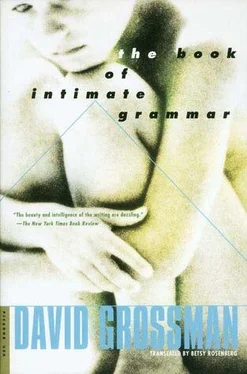David Grossman - The Book of Intimate Grammar
Здесь есть возможность читать онлайн «David Grossman - The Book of Intimate Grammar» весь текст электронной книги совершенно бесплатно (целиком полную версию без сокращений). В некоторых случаях можно слушать аудио, скачать через торрент в формате fb2 и присутствует краткое содержание. Год выпуска: 2002, ISBN: 2002, Издательство: Picador, Жанр: Современная проза, на английском языке. Описание произведения, (предисловие) а так же отзывы посетителей доступны на портале библиотеки ЛибКат.
- Название:The Book of Intimate Grammar
- Автор:
- Издательство:Picador
- Жанр:
- Год:2002
- ISBN:9781466803749
- Рейтинг книги:3 / 5. Голосов: 1
-
Избранное:Добавить в избранное
- Отзывы:
-
Ваша оценка:
- 60
- 1
- 2
- 3
- 4
- 5
The Book of Intimate Grammar: краткое содержание, описание и аннотация
Предлагаем к чтению аннотацию, описание, краткое содержание или предисловие (зависит от того, что написал сам автор книги «The Book of Intimate Grammar»). Если вы не нашли необходимую информацию о книге — напишите в комментариях, мы постараемся отыскать её.
The Book of Intimate Grammar — читать онлайн бесплатно полную книгу (весь текст) целиком
Ниже представлен текст книги, разбитый по страницам. Система сохранения места последней прочитанной страницы, позволяет с удобством читать онлайн бесплатно книгу «The Book of Intimate Grammar», без необходимости каждый раз заново искать на чём Вы остановились. Поставьте закладку, и сможете в любой момент перейти на страницу, на которой закончили чтение.
Интервал:
Закладка:
When will it end? He was utterly exhausted from the squirming and the phony smiles and the whispering onion; and also from this new effort he had to make, because for the first time he understood with his brain how intricately conversations are woven and how many invisible threads there are in the corners of a smile. Yochi came in from the kitchen with another tray of chicken, how many poor hens had given their lives for his bar mitzvah, and Mama tried to grab it from her, but Yochi held fast, and the two of them took a few steps that way, with the tray held high in the air, smiling at the guests, and because they couldn’t quite decide which way to turn, they headed straight to him, the bar mitzvah groom. Have some pupiklach, said Mama, they’re simply delicious. No no, said Yochi sweetly, have a wing. But my gizzards came out like butter today, Mama cajoled him with a cheery face. Hmm, but the wings are really yummy too. Yochi curtsied to him, almost shoving the chicken into his mouth, till he pulled away in alarm. The pupiklach melt in your mouth, urged Mama, fending Yochi off with her shoulder. Try the wings, whispered Yochi conspiratorially, and the aromas swirled around like fog, condensing into heavy drops of gravy. I’ve had enough, I don’t want any more! he protested, why were they jumping on him like that, in front of everyone. With his back to the wall, confused and flushed, he forced himself into his thoughts again: It’s fun to think, it’s relaxing, it fills you with love, where were we, ah yes, he’d always thought it was a family sham, but today a thin membraneseemed to peel from his eyes and he could see something new here, a delicate beauty, even compassion, because everyone knew everyone else’s secrets, everyone was a hostage in someone else’s hands, at their mercy or their cruelty. Why are you thinking these thoughts? Think like a boy your age. It all goes back to your problem. This is just another symptom. You think you’re winning, but you keep losing. And you have to be so careful and conscientious in order to make a single statement without hurting or shaming someone: for instance, Mama was just telling the women they were lucky to have daughters, but she only said it when Rivche, poor Lealeh’s mother, went out to the kitchen. That was a minor mercy, but the air was full of tiny darts, phrases waiting to burst with poison, compliments with false bottoms, the caress of secrets shared, and carefully circumvented topics. These he discerned, as he opened his eyes to them in benevolent wonder. And he too, it seemed, would be spared today.
Three of his cousins came in from the balcony, glanced at him, and stopped their conversation. Go on, join them; no, they’re too young, they don’t know the rules yet the way he does. Go ahead, join the conversation, or was it an argument: which is better, hand brakes or pedal brakes, and how far can a tutu ball fly? But Shimmik wants to take his picture with them, to immortalize them standing together. He turned to the window, pretending to be engrossed in the view. Straighten your shoulders. Try to have a good time. Always be watchful, always be cunning, with grownups, with children, with grownups and children together, like all he needed now was for one of the boys to hear him talking to a grownup, he knew exactly how he sounded. On the other hand, when he was obliged to talk to one of them, to one of the guys, he was careful to use the old language, though it made him feel phony, like a tourist trying to be friendly with the natives, or like a spy in enemy territory, fighting for his life. He smiled a crooked smile as he stood by the window. Who knows, said his smile, what sort of life you’ll have. And he turned away, nervously touching his chest, his waist. Who could say how much life there was in a body like this.
Little Uncle Loniu, Ruja’s husband, found one of Leo Pold’s recordings on top of the phonograph and put it on, balancing a full bottle of wine on his forehead as he danced to the rhythm. The women gathered around him and clapped their hands. Rivche’s Dov stood at the center of the men’s group waving a fat drumstick and telling dirty jokes. Rivchewarned him to lower his voice, little pitchers have big ears, and she glanced at Aron with embarrassment. Aron watched the men out of the corner of his eye. They were heavy, tired-looking, all of them, like patient beasts of burden. Their features seemed to have been engraved as monuments to grief, yet they exuded a lukewarm air of failure and monotony. And once they had been his age. Perhaps they even looked like him. He would never look like them, though. Mama called Papa with her pinchy smile to help her put Mamchu on Yochi’s bed and cover her with the Scottish plaid — She’s so tired, she doesn’t realize how tired she is — but Papa was raptly listening to Dov’s joke about the rabbit who came back to the jungle and told the other animals that he’d shown the lion how to do it right. A smile of lewd anticipation spread over Papa’s face. His lower lip, cracked in the middle, moved in unison with Dov’s. Aron put down the glass of juice he had been holding since the beginning of the party and went to help Mama drag Grandma to his and Yochi’s room. When the door closed behind them and they had tucked in the blanket, Mama said tomorrow, so help her, she was going to throw Grandma out of the house, like a curse she needed her here, he should see what she just did in the bathroom, she ruined everything.
Aron stayed in the room a little longer to look at Grandma. Compassionately he stroked her porcelain face, which was hardly wrinkled because fools never grow old, and for a moment she opened her foggy eyes, trying to recognize him or tell him something, maybe she didn’t remember where words came from anymore. Maybe she was scurrying around inside, crying and searching for the way out. That was exactly how she looked when she came to give him that heirloom. The golden thread. Too bad he hadn’t kept it. He could have shown it to her now and brought her a little happiness. On a sudden impulse, stupidly, he touched her mouth, offering a hint that this was where words come out, and her soft, surprisingly supple lips wound around his finger. For a moment she sucked with the fierceness of a baby, and he drew his hand back in alarm.
Her lips groped blindly for his finger, which was wet with the embarrassing moisture of life, but he managed to hide it just in time. In walked Mama and stood by the door, sensing something, not comprehending. “You leave Grandma alone, you hear? You hear?” she whisperedfuriously. “You let us take care of her. Go do what a kid your age should do, you hear?!” Again he was dispatched to the salon, where he stood alone, confused and agitated. Someone tapped him roughly on the shoulder, frightening him before he had a chance to tense the muscle and disguise his scrawniness. “What’s with you, nebbich?” called Uncle Loniu, who was small and round as a button. “What’s with him, Hindaleh,” he cackled, and everyone heard. “Don’t you feed your bar mitzvah boy?” And a few months later, these words of Uncle Loniu’s spelled the beginning of the end of Aron’s leaps on the rock, as rough-hewn sobs erupted from deep inside, more like the crude ore of the soul than an outburst of tears. He leaped and fell, lacerated by the thorn-bushes and bruised by the stones, his eyes clogged with tears, but he couldn’t do it, so he tried to envision everything that had happened to him over the past two years, all the facets and figments of his problem, and still he crooked his arm at the last moment, till finally, when his strength failed, and all he remembered was that he had to get up and fall, get up and fall on his arm, though sometimes he only imagined he was up, then he suddenly remembered the time at his bar mitzvah when smart little Aunt Rivche caught Loniu by the arm and whispered, What do you want from the boy, give him a rest today, and Loniu shook off her hand and said, “Is this why we came to Israel with the sun and the vitamins and the oranges?” And Rivche caught his arm again and said quietly, tensely, Leave him alone, Loniu. Luz im nuch, what do you think, somebody’s doing something on purpose here? And Loniu crooked his arm and said, “At his age he should be starting to packa packa!” And he looked around, with a grin, and Rivche pressed her face up close and crackled as only the women in the family could: People in glass houses, Loniu. It seems to me the coat rack at our house hangs pretty low too, but again he evaded her and came back to Aron, who was by now completely paralyzed, living, say, in New York, where he read about this sad case in Woman’s magazine; Aron, who survived a night among the corpses in the cellar at Komi by remembering his magnificent bar mitzvah. And Loniu stood screaming at the top of his lungs, “Take a tip from Omri! Look at him! Body-building! Body-building!” And poor tormented Aron peered into his eyes and beheld the vengeance his butterball uncle had wreaked upon nature by means of his son, and for a moment he almost felt compassion for the stupidman, who had burst the bounds of family etiquette and screamed through the lump of anguish that was stuck in everyone’s throat, and then came the blessed moment, two months later, when grief and loneliness overwhelmed his ofzeluchi brain and Aron leaped up and plummeted from the rock and heard, with a mixture of shock and relief, the bone in his arm go crack.
Читать дальшеИнтервал:
Закладка:
Похожие книги на «The Book of Intimate Grammar»
Представляем Вашему вниманию похожие книги на «The Book of Intimate Grammar» списком для выбора. Мы отобрали схожую по названию и смыслу литературу в надежде предоставить читателям больше вариантов отыскать новые, интересные, ещё непрочитанные произведения.
Обсуждение, отзывы о книге «The Book of Intimate Grammar» и просто собственные мнения читателей. Оставьте ваши комментарии, напишите, что Вы думаете о произведении, его смысле или главных героях. Укажите что конкретно понравилось, а что нет, и почему Вы так считаете.












